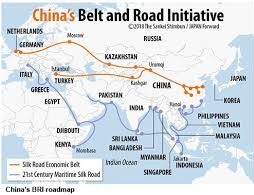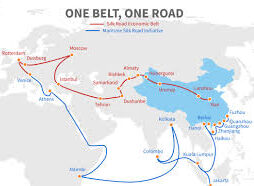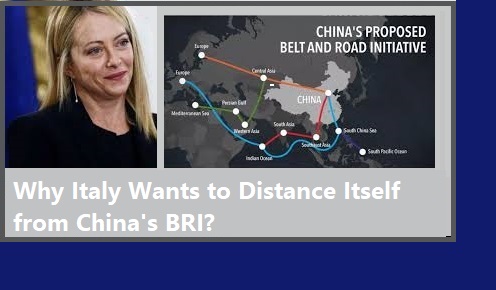Italy’s possible exit from China’s ambitious Belt and Road Initiative (BRI)
In a significant move, Italian Prime Minister Giorgia Meloni hinted at Italy’s possible exit from China’s ambitious Belt and Road Initiative (BRI) during her visit to India on September 10th. Italy, a G7 member, had joined China’s BRI project in 2019, making it the only G7 nation to do so. Meloni’s statement has raised questions about the future of Italy’s relationship with China and its implications for global geopolitics, particularly in the context of India and the G20.

Italy’s Relationship with China Beyond BRI
Meloni’s statement underscores that Italy’s relationship with China extends beyond the BRI. She emphasized that Italy’s decision to potentially withdraw from the BRI would not adversely affect its overall relations with China. However, the final decision on this matter is yet to be made. Italy’s move to reconsider its participation in the BRI project is significant given its previous involvement in China’s infrastructure initiative.
The Meeting with India’s PM Modi
Just after her meeting with Indian Prime Minister Narendra Modi on September 9th, Prime Minister Meloni also held talks with China’s Premier Li Keqiang. Following these meetings, she signaled Italy’s intention to distance itself from the BRI project.

Meloni explained in response to media inquiries that several European countries are not part of China’s Belt and Road Initiative, yet they maintain healthy relations with China. She suggested that Italy and China should aim for a relationship that safeguards the interests of both countries. Furthermore, she mentioned that China had extended an invitation for her to visit the country, although the date has not been confirmed. Additionally, Italy has been invited to participate in the upcoming BRI Forum meeting in China next month.
Understanding China’s Belt and Road Initiative
Before delving into the reasons behind Italy’s potential exit from the BRI, it’s essential to understand the Belt and Road Initiative itself. Chinese President Xi Jinping announced this ambitious plan in 2013 with the goal of reshaping the world through infrastructure development.

To date, nearly 140 countries have been drawn into this web of projects and investments.
Italy’s Shift from Viewing China as an Ally to a Foe
Italy has had a positive economic and trade relationship with China since the 1980s. During the tenure of Romano Prodi, who later became the head of Italy’s Industrial Reconstruction Institute, China sought Italy’s assistance in establishing a factory in the Tianjin region. In return, the Chinese Premier helped Prodi set up a factory in the Soviet Union.

After becoming Prime Minister in 1997, Romano Prodi initiated new trade and business ties with China. Over 100 Chinese companies invested in Italy to boost engineering, food, textiles, and the fashion industry.
However, Italy’s view of China began to change after it joined China’s BRI project in 2019. This decision, made under the government of Giuseppe Conte, was perceived as a hasty move that did not serve Italy’s interests. Consequently, Italy’s economy suffered negative consequences as China increased its exports to Italy threefold within just three years after the agreement.
Why Italy Wants to Distance Itself from China’s BRI
Italy’s initial participation in China’s BRI project was driven by the need to stimulate its economy and improve infrastructure. Like many European countries, Italy was grappling with a decade-long economic downturn. Relations with the European Union were strained, prompting Italy to seek external investments to jumpstart its economy. Italy’s tilt towards China was evident.

However, Italy, like other European nations, realized the risks associated with extensive dependence on China. Several Eastern European countries, such as Estonia and Latvia, have fallen into debt traps due to their association with China. European nations want to engage in trade with China but are wary of potential risks. This realization led Italy to reconsider its participation in the BRI.
Implications for Italy and Europe
Italy’s exit from China’s BRI project before its ten-year completion is a significant diplomatic setback for China. Italy’s participation in the project was seen as a major geopolitical win for China within the G7. Italy’s decision to reconsider sends a signal to other European countries about the importance of carefully weighing the risks and rewards of engaging with China.

It is essential to note that while Italy may withdraw from the BRI, it does not signify a complete rupture in its relationship with China. Italy seeks to balance its economic interests with the need to protect its national security and sovereignty.
Conclusion
Italy’s potential exit from China’s Belt and Road Initiative reflects the changing dynamics of global geopolitics. It highlights the need for countries to carefully evaluate the risks and benefits of engaging with China’s ambitious infrastructure projects. Italy’s decision will likely have ramifications not only for its own economic future but also for the broader European approach to China. As Italy takes this bold step, it signals a shift in the international landscape and raises questions about the future of China’s BRI initiative.
Image Courtesy: Google
For more related news – https://universenews.co.in/category/politics/
